Wilhelm Poland was a missionary at Cape Bedford for twenty years. Like its better-known missionary, Georg Schwarz, he was from Neuendettelsau, but he was an atypical graduate. His published personal memoirs are tight-lipped on the intensive personal dramas that must have played themselves out in the lives of the missionaries there.
Early life
Wilhelm Poland was born on 17 May 1866 as the son of a pastor in a small rural township of Bronn in Bavaria (Upper Franconia). Raised in the manse, he had only indirect experience of the agricultural activities sustaining the community. His mother died when he was age 13, and two years later he sustained a sports injury which resulted in an infected bone and left his lower arm permanently stiff. He was thus marked out for a life of non-physical activity, and unlike most of the candidates entering missionary colleges, he did have the opportunity to study theology at university, for which his father, who had studied at Erlangen and Leipzig, was willing to pay. However, Poland preferred to attend the college at
Neuendettelsau, which he entered in 1884 at age 18, against his father’s wishes. His step-sister Sophie Poland was also at Neuendettelsau.
During his period at Neuendettelsau Poland’s father died in 1886, so that there was little to bind him to Bronn. In 1888 he was sent out to Cape Bedford without being ordained or married.
Resume of Wilhelm Georg Friedrich Poland
Neuendettelsau, 8 April 1888
Born on 17 May 1886 at Bronn near Peknitz, I was baptised on 25 May, represented by my uncle Georg Poland, Pastor at Tauberzell and Pastor Wilhelm Knappe from Hiltpoltstein. The first and only worry of my dear parents – my father was at the time pastor at Bronn – to raise me in the fear of the Lord and make a me a child of God, and indeed I learned early to loves the Lord Jesus and listened with joy when my father told us the bible stories. He was transferred to Aufhausen near Nördlingen in 1870. There I entered school at age six and with my only sister spent the happiest time of my life, cheerful childhood. In 1876 we had to leave Aufhausen again because the moisture in the manse had a detrimental effect on my father’s health. With that a new life period commenced for me, too. In the spring of 1876 we moved to Hühsingen near Öttingen, and by autumn I already entered the Latin school. According to the wish of my father I was to study. And it was thanks to him that I passed the entry exam with good results.
But as soon as I was no longer under the paternal surveillance my effort slackened. My teachers found many a fault in me, most clearly in my memory is the comment, occuring several times among my grades, ‚doesn’t like to drill through thick planks’. Still I rose from one class to the next up until the fourth grade.
The death of my mother on 30 July 1879 made a devastating impression on me. Henceforward I resolved to want to bring more joy to my father. Added to this was my Confirmation on Sunday Quasimodogeniti in the year 1880. I think to have understood the importance of this act very well at the time, because I renewed my baptismal bond with all earnestness and swore allegiance to my Lord Jesus. Of course I did not realise on that day how soon I was to carry his cross.
In August 1880 I was suddenly overcome with a severe illness. The bone marrow of my upper arm became inflamed, the bone itself started to die off and finally had to be removed after three operations. Twice there was only just a single pace between me and death for which I had wholly prepared myself. From Christmas 1880 my recovery slowly proceeded. This is when a resolve matured inside me which I never again shed and of which I also informed my dear parents (I got a second mother on 3 August 1880). In gratitude for my marvellous rescue I wanted to enter into mission service. My father was not against it, but wanted to interest me in other things, and brought me into the pastoral orphanage at Winzbach, after I had been boarding in the Latin school at Weissenburg from Easter to fall 1881, where my operation had been conducted by the chief medical officer Dörfler. At Winzbach I completed the fourth and fifth Latin class and was supposed to transfer to the Nürnberg Gymnasium, but I did not achieve entry.
From there my path took a decisive turn. The wish to become a missionary made itself felt in me stronger than ever, more so because not long ago I had met the Neuendettelsau mission students at a mission festival at the Heilsbronn monastery. And now my father also didn’t hold me back any longer, but allowed me to enter this mission institute in October 1883. But I was still far from realistically considering the seriousness of this step. It could not be any other way, the sin had already started to reign in me and because I did not fight against it, it went downhill more and more. Three and a half years I stayed in this institution. Unfortunately they passed me by without fruit, although it is too much to say so. One thing that I have taken away with me is the prick of a bad conscience. It did not leave me in peace day or night. Finally I found the strength for commitment through prayer. I was saved a second time, this time from a different death. How I was able to hold fast to my decision is incomprehensible to me, only this I know: it was the first cause of my salvation. It became ever clearer to me: this kind of life is incompatible with your future profession. All doubts that could have made me doubtful were now removed. On 16 June we were struck by the hardest blow that could have been dealt out to us. On that day the Lord look my dear father to him after two years of suffering. From him I have, if not a verbal, but a written considered declaration that he agrees with my plans. My current mother (the second mother-in-law, we lost the first one on 8 November 1881) also lets me set off though with a heavy heart. Therefore I passed my exams at the end of last year and was ceremonially consecrated eight days ago, that is at the holy Easter festival at two o’clock in the afternoon in the local village church. At the end of this month I will, so God wills, depart for Australia (Elim station near Cooktown) for which I am destined. The joy which was wished on me on the day of my consecration will be lent to me by the one who said 'My strength is powerful in the weak’.[1]
At Cape Bedford
Poland arrived at
Cape Bedford in June 1888, joining Father Georg
Schwarz, who was also a bachelor, and was to remain there for 20 years. However, in August 1890, at age 24, he married 23-year old Bavarian Anna Heinrich from Fürth, in Cooktown, two days after her arrival. In that year he was also ordained, at Elim, by Pastor Rechner of Immanuel Synod.
|
Pastor W.G.F. Poland at the time
of his graduation from Neuendettelsau
|
The Poland family in 1905
|
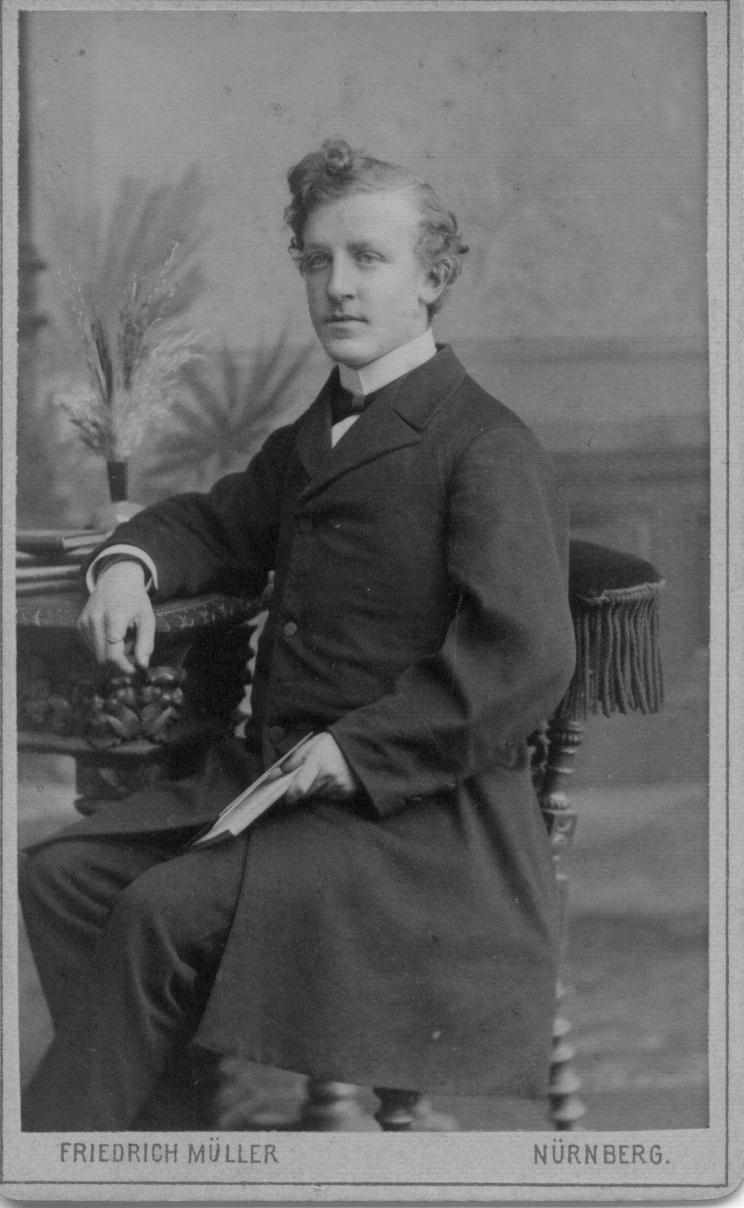 |
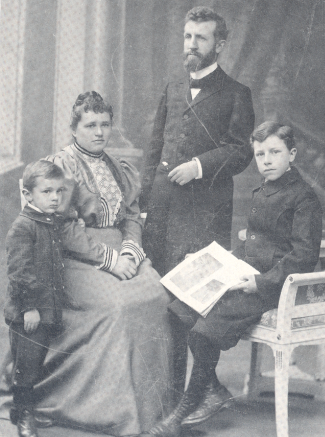 |
| Source: Lutheran Archives Australia |
Source: Poland 1988 |
For ten years the Polands ran the school at Elim, conducting lessons in Guugu Yimidhirr. In his memoirs this period is marked by hardships and dangers. Without its own means of transport, the mission relied on fishing vessels to obtain supplies and offer expensive and unreliable transport to Cooktown. Poland describes one voyage undertaken with his wife who was to give birth at Cooktown. Storms delayed the journey for four days and they spent the rough voyage in the unlit hold retching with sea-sickness. A baby girl was born in December 1891, but took ill and died in April during a period when food supplies had run out, and they could not obtain any baby-food mixture
[2] Despite these hardships, Anna’s sister Mrs Beisel joined the couple at Elim, and in 1893 Schwarz considered marrying her. This woman is barely mentioned in the mission records, but it must have been a comfort to Anna Poland to have her sister there. (In April 1900 a Bloomfield missionary happened to mention that Mrs Beisel, having spent 12 years at Elim, and childless, was very weak
.[3])
In 1894 their son Hermann was born, followed six years later by Wilhelm in June 1901. Both boys grew up with a mixture of German, English and Guugu Yimidhirr, and characteristically ignored the boundaries between them in their early language development, so that four-year old Hermann might say something like “Papa, na, Schmetterling schöner, catch him, uyur.” (Daddy, look a pretty butterfly, catch him, quick.).
[4]
Unlike Schwarz, the Polands resigned themselves to the perceived need to send their children to Germany for schooling. Just a month before their second child was born, the Polands sent seven-year old Hermann to Germany.
Our boy could not be spared from suffering the fate of so many other children of missionaries; he would have to be separated from his parents. His mother faced the approaching day of his departure with growing anxiety and apprehension. She often wept bitterly. There was no escape; always there was the inexorable: It has to be so.
He was to travel with Schwarz, who had just married and was planning to take his new bride on furlough to Germany, and Elim had recently been abandoned in favour of the Hope Valley site. However, at Brisbane Schwarz heard that Bloomfield mission was to be closed down and its residents relocated to Hope Valley. Poland was to supervise the changes. Schwarz abandoned his furlough and returned to Hope Valley, leaving Heinrich with the Rev. Hörlein who took him to Melbourne with his little son Victor. Heinrich travelled with Rev. Bogner to Germany, arriving around August 1902 to live with an uncle
.[5]
When Schwarz had children of his own, they were not allowed to speak any language other than English, perhaps because the early language development of the Poland boys was considered alarming.
Poland spent half a year at Bloomfield and oversaw the winding down of the mission and the relocation of its residents to Hope Valley in mid-1902. In 1905 the Polands and Mrs Beisel departed for Germany where four-year old Wilhelm was to be left to attend school. Poland had not seen Germany for 17 years, and Anna had been away for 15 years. They had not seen Hermann for four years. So there were many reasons for strong emotions, and they were farewelled under many tears all around. A number of mission residents wrote letters in Guugu Yimidhirr to them in Germany.
Poland was replaced by an English lay missionary, Mr Field, who had spent two years at Yarrabah and who volunteered to step into the position without pay. The Polands enjoyed eighteen months in Germany, where they visited family, spent time with their sons, and also called on Schwarz’s family. They left both their sons and Anna’s sister behind and must have returned to Hope Valley with mixed emotions, shortly after it had been struck by a cyclone in 1907.
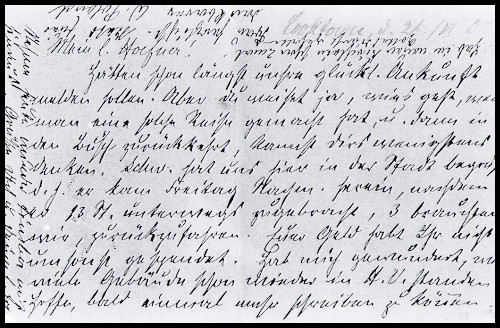 |
This postcard was written after the Polands returned from their sabbatical in Germany to find the mission devasted by the cyclone.
(The postcard was purchased on Ebay by Bev Shay, Cooktown and Regional Historical Society via Marge and Mick Cook and Bruce Rigsby)
|
|
Cooktown, den 26. VI 07
Mein l. Hafner!
Hätten schon längst unsere glückl. Ankunft melden sollen.
Aber Du weisst ja, wie es geht, wenn man eine solche Reise
gemacht hat, u. dann in den Busch zurückkehrt, kannst dir’s
wenigstens denken. Schw. hat uns hier in der Stadt begrüsst
d. h. er kam Freitag Nachm. nachdem er 13 St. unterwegs
zugebracht, 3 brauchten wir, zurückzufahren.
Euer Geld habt Ihr nicht umsonst gespendet. Hab mich
gewundert, wie viele Gebäude schon wieder in
H.V. standen – hoffe bald einmal mehr schreiben zu können.
Nehme heute wieder timber mit hinaus
Grüsse dich u. deine l. Frau herzlichst -
Stets Euer
dankbarer W. Poland
|
Translation by Regina Ganter
Cooktown, the 26th June 1907
My dear Hafner,
should have notified you ages ago of our happy return. But you know how it is after undertaking such a journey and then returning to the bush, or at least you can imagine. Schw. [missionary Rev. Schwarz] came to greet us in town, that is he arrived Friday afternoon after spending 13 hours on the road, it took us three to drive back. You have not spent your money in vain. I was amazed how many buildings are already up again in Hope Valley – hope to be able to write more soon.
Taking some more timber back with me today.
Heartfelt greetings to you and your dear wife,
ever your grateful W. Poland
|
In 1909 they decided to end their missionary efforts, Poland arguing that the mission no longer needed two missionaries, since there was only one station, and that was poorly enough funded. However, by 1912 a new missionary was already assigned to assist Schwarz.
From missionary to parish priest
Poland became pastor at Ipswich for seven months before they moved on to Douglas near Toowoomba in 1910. Just before World War I erupted, they managed to get their sons back to Australia. During World War I, Poland was interned as an enemy alien, together with other Lutheran pastors, at Trial Bay and at Holdsworthy camp, for three and a half years. He was arrested at the church at Douglas on Good Friday 21 April 1916, and released in 1919.
| German missionaries at Trial Bay internment camp |
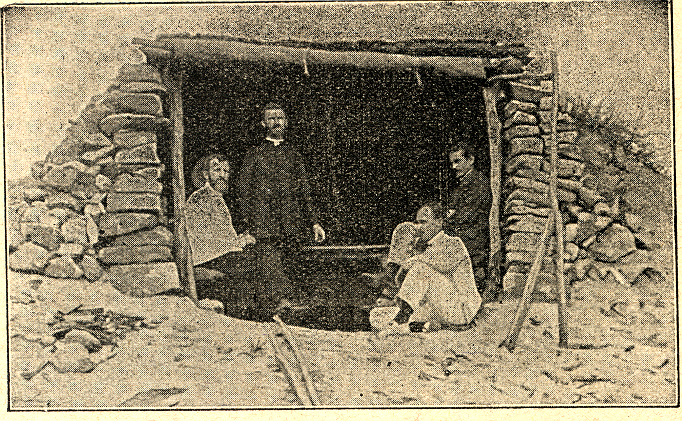 |
|
On the left are Pastors Poland and Fuhlbohm, to their right missionaries W. Flierl and behind him Raum. They constructed this shelter themselves.
Source: Koller, 1924, p. 122
|
After his release from internment Poland returned to Douglas. He became naturalised in 1921, and retired at age 67 in 1933. The Polands finally purchased a home of their own at Crows Nest, but after only nine months Anna died in March 1934, at age 67, just weeks before the first grandchild was to be baptised and their youngest son married.
[6]
Poland undertook a further visit to Germany in about 1934, when he again visited the Schwarz family. He had been naturalised in 1921 and had therefore lost his German citizenship, so that during World War II he escaped internment.
During world war II Poland occasionally held services at Logan, where he met up again with his old colleague Schwarz. After the war he joined Wilhelm who was now married at Crows Nest, where he died on 5 August 1955, age 89
.[7]
|
Pastor Poland (on the right) with Rev. Heinrich Prenzler(in black vest) and Hermine (nee Schmidt), and August and Elise Simpfendorfer
|
Pastor Poland with Wilhelm Wiencke and Alma (nee Seeman) at Crows Nest
|
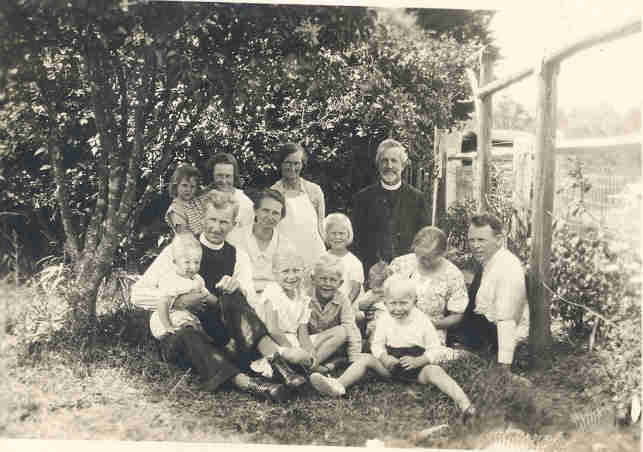 |
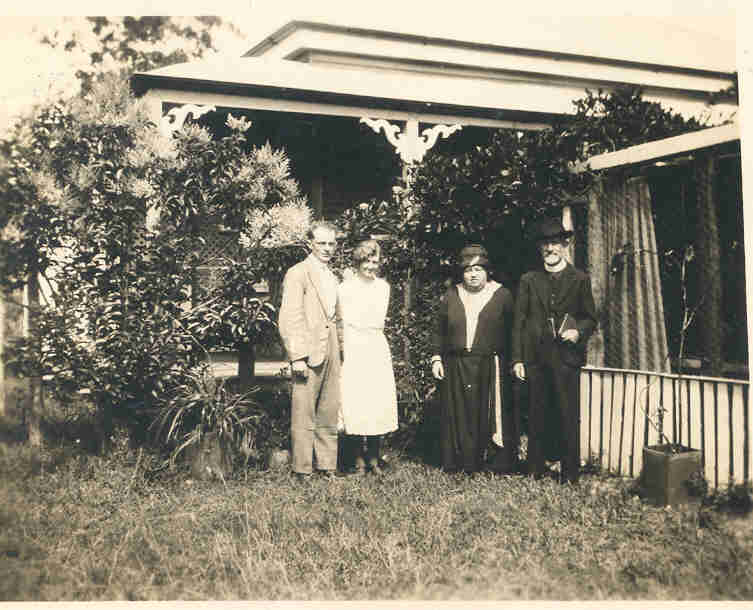 |
| Source: Maria Schwarz collections. Identifications by Ivan and Olga Roennfeldt |
Source: Maria Schwarz collections. Identifications by Ivan and Olga Roennfeldt |
|
Pastor Poland with Arthur and Martha Reuther (on the right)
and Pastor Wiencke (left) at Crows Nest
|
Pastor Poland (on the right) on an excursion
|
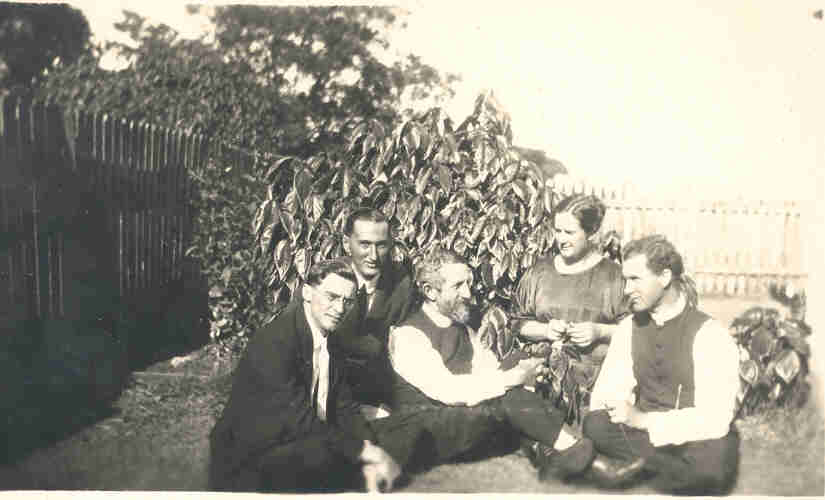 |
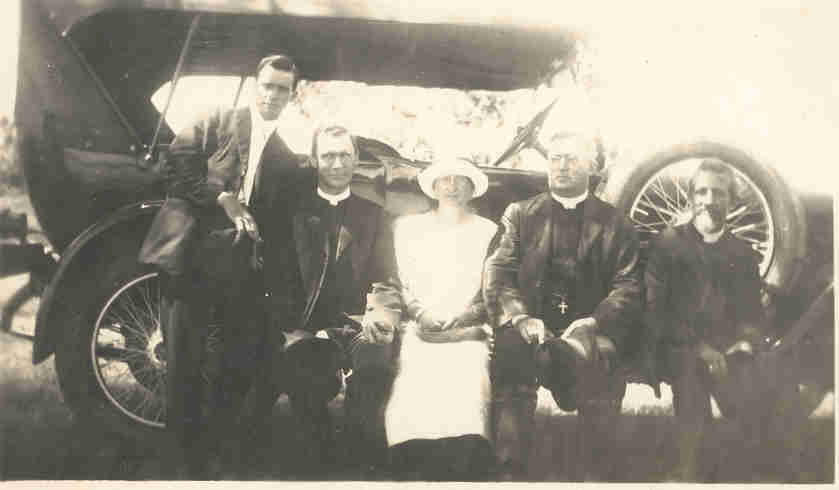 |
| Source: Maria Schwarz collections. Identifications by Ivan and Olga Roennfeldt and Judith Stallard. Wiencke served in Alberton, Queensland from 1924 to 1936, and died in Adelaide in 1939. |
Source: Maria Schwarz collections. |
Poem written by Pastor E.V.H. Gutekunst
in honour of Pastor W. Poland’s birthday,
while both were interned at Trial Bay, 17 May 1917[8]:
Statt Lenzesjubel, Herbsteswehen Instead of joyous spring, autumnal gloom
In diesem ganz verdrehten Land in this upside down land
Statt Freiheitslieder, Zuchthausstöhnen instead of freedom songs, moans of jail
Wie man es nirgends schlimmer fand! It could not be worse anywhere
An solchem Ort Geburtstag haben To have your birthday in a place like this
Dazu noch fern vom eignen Heim And moreover far from home
Das ist fürwahr ein Grund zum Klagen Is truly cause for complaint
Zum traurig statt zum freudig sein! For being sad instead of joyful
Doch lassen wir die düstern Bilder! But leave aside these mournful images
Vergessen wir den Ort und Zeit, forget the place and the time we’re in
So werden unsere Herzen milder and our hearts will mellow
Und Freud entstehet aus dem Leid. And the suffering turns to joy.
Voll Dank schaust Du zurück aufs Leben Full of thanks you reflect back on your life
Von dem geschenkt Dir manches Jahr of which you have been given many years
Wie viel hat dir dein Gott gegeben how much your God has given you
Wie treu bewahrt Dich immerdar! And looked after you always
Und auch die Lieben Deinen bleiben And your loved ones remain
Trotz Feuerschein in seiner Hut in his care despite the glow of fire
Sie sollen keinen Mangel leiden shall they not suffer any want
Fürwahr der Vater meinte es gut. Truly the Father meant well
Wir wünschen Dir zum heutgen Tage: we wish you for this day
Viel Glück und freud’ge Zuversicht, happiness and joyous trust
Und dass gar bald die Stunde schlage and that soon the hour will come
In der Du mit den Deinen bist! When you will be with your loved ones.
From your fellow prisoner
E.V. H. Gutekunst, Trial Bay
[1] Lebenslaufbücher: Australien/USA, Missionswerk der Evang.Luth Kirche in Bayern, Neuendettelsau.
[2] Poland, W.G.F. Loose Leaves: Reminiscences of a Pioneer North Queensland Missionary, Adelaide, Lutheran Publishing House 1988, p.28, p. 68. This birth is thought to have been the birth of Wilhelm.
[3] 15 April 1900 Mack to committee, Bloomfield correspondence, Lutheran Archives Australia.
[4] Poland, W.G.F. Loose Leaves: Reminiscences of a Pioneer North Queensland Missionary, Adelaide, Lutheran Publishing House 1988, p. 48.
[5] 1 September 1901 Hoerlein to Kaibel, 16 August 1902 Poland to Kaibel, Bloomfield correspondence, Lutheran Archives Australia.
[6] Poland, W. ‘Frau Pastor Poland’ (obituary) Lutheran Herald, 7 May 1934, p. 156-157.
[7] Poland, W.G.F. Loose Leaves: Reminiscences of a Pioneer North Queensland Missionary, Adelaide, Lutheran Publishing House 1988.
[8] In Poland file, Lutheran Archives Australia.







